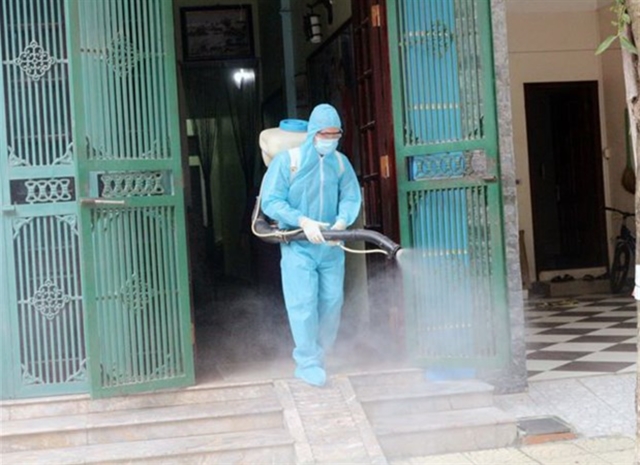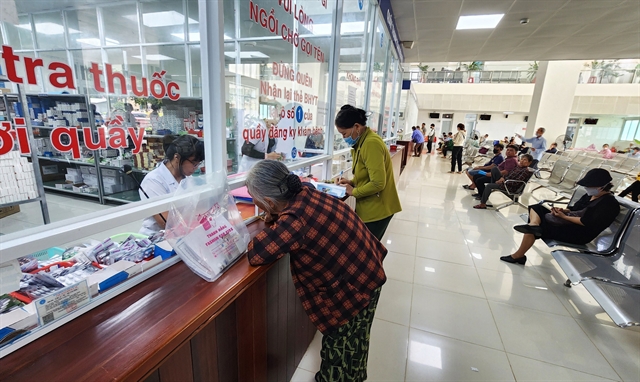 Society
Society

 |
| Mosquito spraying to prevent dengue fever spreading in Hà Nội. — VNA/VNS Photo Nguyễn Chinh |
HÀ NỘI — Việt Nam has recorded nearly 270,300 cases of dengue fever, which has resulted in 108 deaths, since the beginning of this year, reported the Ministry of Health.
The number of infected cases increased 4.8 times while the number of deaths increased by 87 cases compared to the same period last year.
However, in the latest tracking period, 9,677 cases were detected in the week from October 17 to 23, quite lower than the previous week which saw 11,260 cases.
It is forecast that the number of cases and deaths will peak in November and December.
A high number of infections and deaths is still concentrated in the South, Central, and Central Highlands (Tây Nguyên) regions while the northern region has also recorded a considerable uptick in the number of cases and deaths.
According to the Centre for Tropical Diseases (at the Hà Nội-based Bạch Mai Hospital), the number of dengue fever patients in Hà Nội and neighbouring provinces has been increasing, with the peak in the next two months.
Doctors warned that there will be a risk of 'concurrent outbreaks' of several diseases such as COVID-19, Adenovirus, flu, and chickenpox along with dengue when the weather in the northern region changes.
Assoc., Dr Đỗ Duy Cường, the centre’s director, said: “This year, there will be a big outbreak of dengue fever in the northern region because it is on a five-year cycle.”
“In August, the number of dengue fever patients hospitalised at the centre was only 70 but the number increased to 160 and 250 in September and in October, respectively,” Cường said.
“The patients came mainly from suburban districts such as Đan Phượng, Thuờng Tín, Hoài Đức and Long Biên, then spread to inner city districts of Nam Từ Liêm, Thanh Xuân, Đống Đa and Hoàng Mai," the doctor said.
Meanwhile, the Hà Nội Centre for Disease Control (CDC) reported that from October 17 to 23, Hà Nội registered 1,420 cases of dengue fever in 30 districts and townships, increasing the total number of infected cases since earlier this year to 8,199, including five deaths.
Infections increased by 3.3 times compared to the same period last year with 2,482 cases. and circulating dengue virus types are DENV1, DENV2 and DENV4, the centre said.
Meanwhile, HCM City, so far, has recorded 66,699 cases, including 29 deaths, of which there were 2,000 cases in the week of October 17 to 23.
Although the number of dengue fever infections is on a downward trend, up to now, the number of cases has increased seven times and the number of severe cases has increased 3.6 times compared to the same period last year.
The HCM City Department of Health has asked health care facilities to implement a red alert process for patients with severe and critical dengue fever at risk of death to promptly save the patient's life.
The city’s health sector has also established a 33-member group of experts for dengue fever treatment with the task of guiding the treatment of dengue fever and analysing severe and fatal cases as well as providing trainings and remote consultation and treatment of severe dengue patients.
Patients with warning signs need to be hospitalised
According to doctors, people with mild dengue fever can be monitored and treated as outpatients at home.
Patients with body aches, pains and fever need to use antipyretics and analgesic but avoid drugs such as aspirin and ibuprofen because they can cause bleeding.
Patients should also not use antibiotics and arbitrarily transfuse fluid such as protein, albumin, blood or high molecular solutions.
Patients need to drink plenty of fluids, well eat and rest. After five days, the fever will probably stop.
However, experts recommend that patients must pay close attention to monitor and recognise the warning signs of dengue fever, including lethargy, severe abdominal pain, vomiting, enlarged and painful liver, gums and nose bleeding, vomiting blood, black stools, blood in the urine, abnormal vaginal bleeding, reduced urine, and an increase in red blood cell volume but a rapid decrease in platelets in blood tests.
If one of these signs is present, patients need to be hospitalised for monitoring because there is a risk of shock, severe bleeding, multi-organ failure and death if not treated in a timely manner.
Severe warning signs usually appear between the third and seventh day of illness. — VNS




